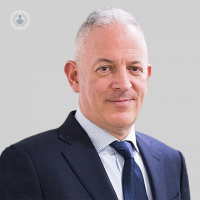Surgery in inflammatory bowel disease (IBD): ulcerative colitis
Written by:Ulcerative colitis (UC) is an inflammatory condition which affects the colon and causes symptoms such as mucous and bloody diarrhoea. Sometimes, medication isn’t enough to offer long-lasting relief from the condition. Professor Richard Cohen, a colorectal surgeon and expert in IBD, explains the surgical measures that can be provided to achieve an improved quality of life for people suffering from UC.

Ulcerative colitis and its symptoms
Ulcerative Colitis (UC) is an inflammation of the lining (mucosa) of the bowel that affects a varying amount of the colon and rectum. Symptoms include bloody diarrhoea and passage of mucous when opening the bowels. Depending on how much of the bowel is affected and the degree of the inflammation, patients can vary from suffering a minor nuisance to being extremely unwell.
How is it treated?
UC is treated with anti-inflammatory medication including steroids, immunotherapy (azathioprine) and biological therapy. Patients are often managed by a multi-disciplinary team consisting of a surgeon, a gastroenterologist backed up by nurses, radiologists and pharmacists.
What role does surgery play in treating UC?
The role of surgery in the following categories of UC patients is as follows:
- When the patient has severe acute colitis: Under these conditions, the colon may need to be removed as a matter of urgency to avoid perforation and peritonitis (inflammation of the peritoneum) if medication is not quickly effective.
- When medical management has been unsuccessful: Under these circumstances, patients are chronically unwell despite maximal medical therapy
- When the lining cells change towards malignancy (cancerous cells): This situation can arise in patients with total colitis who have had the disease for longer than a decade. Regular colonoscopic evaluation and biopsies may indicate that there is a change towards bowel cancer and the patient is best served by having the colon removed.
What surgical options are there?
There are various surgical options:
One option is the removal of the colon and rectum with and replacing it with a small bowel pouch reservoir (known as an ileoanal “pouch”). This procedure is often done in stages depending on how unwell the patient is at the time. The interval between the stages is usually three to six months.
- Three stages
- Removal of the colon, leaving the rectum behind with an end ileostomy
- Removal of the rectum and the creation of a pouch with a loop ileostomy
- Reversal of the ileostomy
- Two stages
- Removal of the colon and rectum with the creation of an ileoanal pouch with a loop ileostomy
- Reversal of ileostomy
- One stage
- Removal of colon and rectum with the creation of an ileoanal pouch with no ileostomy
Another option is the removal of the colon, rectum and anal canal with a permanent ileostomy.
The decision regarding the best option is made between the surgeon, patient and gastroenterologist. Whilst nobody wants to have an ileostomy, it can be the safest way to manage the situation and is often a temporary safety measure.
Professor Richard Cohen is a leading London colorectal and general surgeon. Visit his profile to learn how he can help you with your colorectal health.


